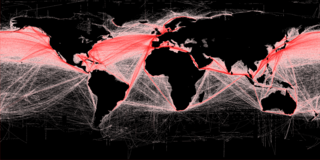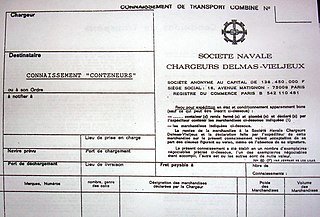
Freight transport, also referred as freight forwarding, is the physical process of transporting commodities and merchandise goods and cargo. The term shipping originally referred to transport by sea but in American English, it has been extended to refer to transport by land or air as well. "Logistics", a term borrowed from the military environment, is also used in the same sense.
The Incoterms or International Commercial Terms are a series of pre-defined commercial terms published by the International Chamber of Commerce (ICC) relating to international commercial law. Incoterms define the responsibilities of exporters and importers in the arrangement of shipments and the transfer of liability involved at various stages of the transaction. They are widely used in international commercial transactions or procurement processes and their use is encouraged by trade councils, courts and international lawyers. A series of three-letter trade terms related to common contractual sales practices, the Incoterms rules are intended primarily to clearly communicate the tasks, costs, and risks associated with the global or international transportation and delivery of goods. Incoterms inform sales contracts defining respective obligations, costs, and risks involved in the delivery of goods from the seller to the buyer, but they do not themselves conclude a contract, determine the price payable, currency or credit terms, govern contract law or define where title to goods transfers.

In transportation, freight refers to goods conveyed by land, water or air, while cargo refers specifically to freight when conveyed via water or air. In economics, freight refers to goods transported at a freight rate for commercial gain. The term cargo is also used in case of goods in the cold-chain, because the perishable inventory is always in transit towards a final end-use, even when it is held in cold storage or other similar climate-controlled facilities, including warehouses.

FOB is a term in international commercial law specifying at what point respective obligations, costs, and risk involved in the delivery of goods shift from the seller to the buyer under the Incoterms standard published by the International Chamber of Commerce. FOB is only used in non-containerized sea freight or inland waterway transport. As with all Incoterms, FOB does not define the point at which ownership of the goods is transferred.
In a contract of carriage, the consignee is the entity who is financially responsible for the receipt of a shipment. Generally, but not always, the consignee is the same as the receiver.

A freight rate is a price at which a certain cargo is delivered from one point to another. The price depends on the form of the cargo, the mode of transport, the weight of the cargo, and the distance to the delivery destination. Many shipping services, especially air carriers, use dimensional weight for calculating the price, which takes into account both weight and volume of the cargo.

The FIATA International Federation of Freight Forwarders Associations is a non-governmental organisation representing freight forwarders worldwide. According to the FIATA Annual Report 2021, FIATA counted 109 Associations Members representing the freight forwarding industry within a territory and 5959 Individual members, representing freight forwarding and logistics companies.

Freight companies are companies that specialize in the moving of freight, or cargo, from one place to another. These companies are divided into several variant sections. For example, international freight forwarders ship goods internationally from country to country, and domestic freight forwarders, ship goods within a single country.
The Automated Export System (AES) is the system used by U.S. exporters to electronically declare their international exports, known as Electronic Export Information (EEI), to the Census Bureau to help compile U.S. export and trade statistics. This information is also shared with the Bureau of Industry and Security, the Directorate of Defense Trade Controls, and other federal agencies involved in monitoring and validating U.S. exports. Formerly this declaration was only made on paper on the Shipper's Export Declaration form.
An air waybill (AWB) or air consignment note is a receipt issued by an international airline for goods and an evidence of the contract of carriage. It is not a document of title to the goods. The air waybill is non-negotiable.
Standard Trading Conditions (STC) are standardized terms imposed by some countries for accepting cargo by shipping lines, airlines and logistics services providers like freight forwarders and customs agents. They are usually printed as the fine print behind the shipping documents like bill of lading, air way bill, or consignment note. These standard trading conditions state the general contract terms and conditions between the two contracting parties who do a contract of transportation or storage or otherwise handling of goods.
The Hong Kong Association of Freight Forwarding & Logistics Ltd (HAFFA) is a non-profit organization which promotes, protects and develops the carriage of goods generally, and the businesses of cargo forwarding agents and logistics service providers in particular.
The British International Freight Association, also known as BIFA, is the prime United Kingdom trade association representing UK freight forwarders. These are companies that forward goods internationally on behalf of importers and exporters. It is a not-for-profit organisation owned by its members and managed by a small Secretariat. The board has seven non-executive directors and three executive directors.
Khimji Poonja Freight Forwarders Pvt. Ltd. is an established custom house agency and a freight forwarding company based out of Mumbai, India. The company provides customs clearing services along with other allied logistics like Air and Sea freight forwarding, Surface Transport, Insurance, Warehousing and door to door delivery of goods. Khimji Poonja also assists its clients in all aspects of International transportation encompassing import and export Sea freight, Airfreight, Heavy lifts, Break bulk and all allied services.

A bill of lading is a document issued by a carrier to acknowledge receipt of cargo for shipment. Although the term is historically related only to carriage by sea, a bill of lading may today be used for any type of carriage of goods. Bills of lading are one of three crucial documents used in international trade to ensure that exporters receive payment and importers receive the merchandise. The other two documents are a policy of insurance and an invoice. Whereas a bill of lading is negotiable, both a policy and an invoice are assignable. In international trade outside the United States, bills of lading are distinct from waybills in that the latter are not transferable and do not confer title. Nevertheless, the UK Carriage of Goods by Sea Act 1992 grants "all rights of suit under the contract of carriage" to the lawful holder of a bill of lading, or to the consignee under a sea waybill or a ship's delivery order.
Uganda Clearing Industry & Forwarding Association is a member-owned institution with over 200 companies licensed by URA. Its secretariat is located in Nakawa, Kampala on Jinja Road, opposite Spear Motors.
UFFA is an acronym for Uganda Freight Forwarders Association formed in 2001 from UCIFA. As a member of FIATA, it aims at promoting professionalism and integrity in the freight forwarding industry in Uganda. Membership to UFFA is for both local and foreign companies involved directly and/ or indirectly in freight logistics.
A freight claim or cargo claim is a legal demand by a shipper or consignee against a carrier in respect of damage to a shipment, or loss thereof.
A freight broker is an intermediary between a shipper and a freight service provider. Freight brokers can specialize in certain types of freight, such as equipment hauling on lowboys, oversize, bulk tanker, auto, or other types of freight transportation.
The freight technology sector, also known as FreightTech, refers to software companies and technologies which assist in supply chain management and the movement of freight. In the five years following 2014, investment in FreightTech companies grew from $118 million to $3 billion per year.






